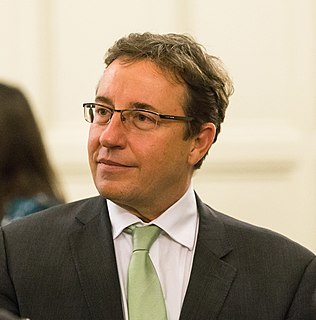A Quote by Donald Phillip Verene
The promise of technology is to remove the division between culture and nature. Whatever part of nature that is left over as an independent force is covered by the technological bluff, which refers it to the agenda of the future and disguises the deficiencies of the present.
Related Quotes
The romantics were reacting against a modern culture that divided individuals from themselves (through specialisation in the division of labor), from others (the competitive market place) and from nature, which had been reduced down to a machine through technology. The antidote to such division is unity and wholeness, which means feeling at home again in the world.
Technology is neutral and sterile. Now, technology is the nature of modern man; it is our environment and our horizon. Of course, every work of man is a negation of nature, but at the same time, it is a bridge between nature and us. Technology changes nature in a more radical and decisive manner: it throws it out.
Inability to accept the mystic experience is more than an intellectual handicap. Lack of awareness of the basic unity of organism and environment is a serious and dangerous hallucination. For in a civilization equipped with immense technological power, the sense of alienation between man and nature leads to the use of technology in a hostile spirit—-to the “conquest” of nature instead of intelligent co-operation with nature.
We have to do away with a false and misleading dualism, one which abstracts man on the one hand and technology on the other, as if the two were quite separate kinds of realities.... Man is by nature a technological animal; to be human is to be technological.... When we speak of technology, this is another way of speaking about man himself in one of his manifestations.
The ideals of technological culture remain underdeveloped and therefore outside of popular culture and the practical ideals of democracy. This is also why society as a whole has no control over technological developments. And this is one of the gravest threats to democracy in the near future. It is, then, imperative to develop a democratic technological culture.
Sex is probably one of the last forms of human expression to enjoy such a direct connection with nature. It might be the primary site of conflict between nature and culture. If one assumes that nature (or instinct) is repressed in a highly civilised society, then I think the conceptual dyad nature-culture is best preserved there, in the realm of sex.
'The anthropocene' refers to the way we live now, in a highly globalized world, characterized by a large human population and powerful technologies that allow for "action at a distance" that aggregate apparently negligible acts into powerful forces that are transforming fundamental planetary systems. In this sense 'the anthropocene' refers to a period in which nature as an independent autonomous domain comes to an end or is under serious threat.
The solution of present-day problems lie in the re-establishment of a harmonious relationship between man and nature. To keep this relationship permanent we will have to digest the definition of real development: development is synonymous with culture. When we sublimate nature in a way that we achieve peace, happiness, prosperity and, ultimately, fulfilment along with satisfying our basic needs, we march towards culture.
Nature consists of facts and of regularities, and is in itself neither moral nor immoral. It is we who impose our standards upon nature, and who in this way introduce morals into the natural world, in spite the fact that we are part of this world. We are products of nature, but nature has made us together with our power of altering the world, of foreseeing and of planning for the future, and of making far-reaching decisions for which we are morally responsible. Yet, responsibility, decisions, enter the world of nature only with us



































